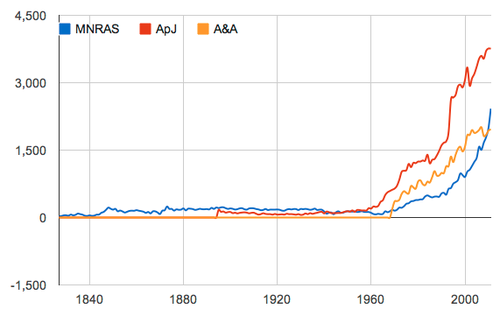"academic publishing" entries

Mining the astronomical literature
A clever data project shows the promise of open and freely accessible academic literature.
There is a huge debate right now about making academic literature freely accessible and moving toward open access. But what would be possible if people stopped talking about it and just dug in and got on with it?
NASA’s Astrophysics Data System (ADS), hosted by the Smithsonian Astrophysical Observatory (SAO), has quietly been working away since the mid-’90s. Without much, if any, fanfare amongst the other disciplines, it has moved astronomers into a world where access to the literature is just a given. It’s something they don’t have to think about all that much.
The ADS service provides access to abstracts for virtually all of the astronomical literature. But it also provides access to the full text of more than half a million papers, going right back to the start of peer-reviewed journals in the 1800s. The service has links to online data archives, along with reference and citation information for each of the papers, and it’s all searchable and downloadable.

Number of papers published in the three main astronomy journals each year. CREDIT: Robert Simpson
The existence of the ADS, along with the arXiv pre-print server, has meant that most astronomers haven’t seen the inside of a brick-built library since the late 1990s.
It also makes astronomy almost uniquely well placed for interesting data mining experiments, experiments that hint at what the rest of academia could do if they followed astronomy’s lead. The fact that the discipline’s literature has been scanned, archived, indexed and catalogued, and placed behind a RESTful API makes it a treasure trove, both for hypothesis generation and sociological research.

Calling Out Risk-Averse Publishers
Bloomsbury Academic is testing the theory that increased awareness from free distribution boosts book sales. The recently-launched imprint is releasing all of its titles online under a Creative Commons license while also selling print-on-demand editions. Discussing the rationale with the Chronicle of Higher Education, Bloomsbury's Frances Pinter cites the unnecessary chasm between envelope-pushers and conservative publishers: "I'm tired of the…

Colleges Weigh Blanket Copyright Licenses vs Fair Use Rights
The Copyright Clearance Center is extending its offer of blanket licenses to larger universities. In a 2007 article in the Chronicle of Higher Education (subscription required), some school administrators expressed concern about the implicit waiver of fair use assertions: But some librarians are ambivalent about blanket licenses, Mr. Rehbach [Jeffrey R. Rehbach, the library-policy adviser at Middlebury College] says,…

ALA 2008: Librarians and Patrons Want More Openness
Librarians and publishers debated a host of e-publishing issues at the 2008 American Library Association conference.

Survey Results: Students Rely on Digital Tools for Research
Results from Ebrary's 2008 Global Student E-Book Survey show that students working on research projects use digital reference tools more often than print materials. From Publishers Weekly: Respondents say they use Google and other search engines as well as e-books more than print books for research assignments; online encyclopedias and Wikipedia are only slightly less used than print books,…

Local Focus through Community Newspaper Book Reviews
Sanford Thatcher, the departing head of the Association of American University Presses (AAUP), advises his colleagues to go local by way of the review: It seems to me that there is likely to be no better market for the general-interest titles that we all publish from time to time than the college towns in which many of our presses…